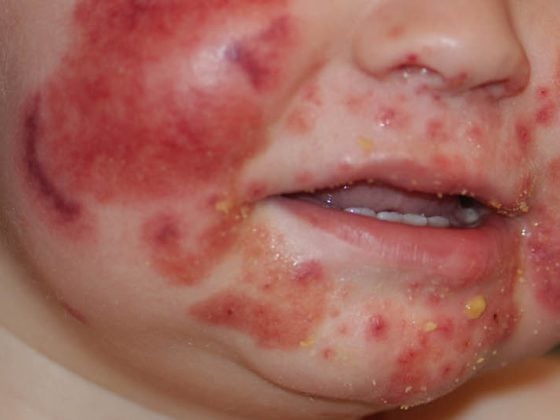Rüdiger Müller, M.D., senior physician in rheumatology at the Cantonal Hospital in St.Gallen, provided DERMATOLOGIE PRAXIS with information on developments in the field of psoriatic arthritis. The focus was on the possibilities of early detection, but also on the new active substances that are currently in development and about to be approved. What do the various therapies offer and where does the expert still see room for improvement?
Dr. Müller, psoriatic arthritis has a very heterogeneous appearance. Which symptoms can be found at all or how can the disease be recognized as early as possible and differentiated from others?
Dr. Müller:
For the rheumatologist, psoriatic arthritis is first and foremost an arthritis. Diagnostically, it can be distinguished from other forms by the presence of psoriasis. This does not necessarily have to be manifested at the same time as the joint complaints: A clear documentation of such psoriasis in the past is sufficient for me in principle for the finding.
If there are only joint complaints without cutaneous manifestations, I personally proceed hierarchically: First, I try to diagnose the most common disease, namely rheumatoid arthritis. This is also where the most freedom in therapy is offered. If such an approach is not possible, I test the diagnosis of peripheral spondyloarthritis, which includes several clinical pictures, sometimes also psoriatic arthritis. If there is further evidence of psoriatic arthritis, I call the disease psoriatic arthritis. In principle, however, it makes no difference whether I speak of spondyloarthritis or psoriatic arthritis, since the treatment strategies are almost identical.
So much for the theory: the fact that arthralgia is nevertheless frequently overlooked by the primary care provider and also by the dermatologist represents a relevant problem. Again and again, people underestimate the broad spectrum of manifestations. For example, it is often forgotten that psoriatic arthritis can be associated with enthesitides or dactylitides, as well as spinal involvement and inflammatory back pain. Awareness urgently needs to be raised further. Much of what we rheumatologists do diagnostically in psoriatic arthritis, primary care physicians can do as well, although not to the ultimate degree of differentiation. In this regard, improved collaboration with primary care providers would be desirable so that patients could possibly be treated more quickly and effectively. Like all arthritis, psoriatic arthritis is unfortunately underdiagnosed and undertreated.
The state of knowledge about the pathomechanisms of psoriatic arthritis is improving, and thus the therapeutic landscape is slowly changing. Which approaches in the field of biologics (e.g. TNF-α, interleukin inhibitors) and “small molecules” (e.g. PDE4 inhibitors) are currently being tested or already being used?
All in all, it must unfortunately be said that in this country hardly anything has been done in the therapy of this condition in recent years. We have the TNF-α antagonists and before that methotrexate, leflunomide and sulfasalazine. Although new TNF-α antagonists have been added again and again, nothing has fundamentally changed as a result, since these were only extensions of a specific mechanism.
In the meantime, there are promising developments and we are therefore looking forward with hope to the new substances that will hopefully soon be available in Switzerland. Ustekinumab and apremilast, for example, are in the approval process. Although the interleukin inhibitor ustekinumab is approved for the treatment of psoriatic arthritis in the USA, it is not yet approved in Switzerland. We will then see where this substance will find its place in therapy outside of clinical trials.
Let’s take a closer look at the second substance mentioned, whose approval is also pending outside the USA: Apremilast, an active ingredient from the group of PDE4 inhibitors. What were the results of the phase III trials of the PALACE program and where do you see the potential of this drug?
Personally, I am looking forward to this active ingredient. Two of my patients participated in the PALACE study. In the PALACE 1 trial [1], up to 40% achieved the primary endpoint of an ACR20 with apremilast, compared with 19% with placebo. This is a statistically significant result. Recent long-term data from PALACE 1 [2] suggest that response rates greater than 50% are possible with apremilast. I think the active ingredient will therefore also have great success in this country, simply because it is a pill. This can be used to better communicate the therapy to patients, as most will forgo an injection, I suspect, if there is also a pill for their disease.
Are any side effects particularly relevant here?
No, nothing that would make me nervous. Gastrointestinal symptoms may occur and there is a slight increased tendency to infection. Overall, the side effect profile is good and no alarm signals are found.
What advantages do the new therapies promise over the earlier ones?
The promise of “small molecules” is based on the fact that they intervene at very different points in the inflammatory process. For me, however, it is more important what clinical outcome the therapy ultimately achieves.
The goal of any drug therapy is to control inflammatory activity at the earliest possible stages. But how is low disease activity even definable?
This is actually very difficult in psoriatic arthritis. After all, this ailment includes various medical conditions: Tendonitis, arthritis, dactylitis, spine inflammation, nail bed inflammation and psoriasis. Accordingly, one has various disease indices such as PASI, NAPSI, DAS28, etc. available. The problem: You can’t commit to one factor without neglecting the other symptoms and problems. Therefore, I would advocate also adding a higher-level score such as the HAQ (Health Assessment Questionnaire), which does not focus on the individual manifestations but, in the end, simply asks the patient how well they function in their daily life. In the clinic, of course, the holistic approach with different scores cannot always be implemented equally well, but one should try to include patient-centered parameters such as functionality and quality of life in the therapy concept in any case. Of course, at some point the inventory with multiple scores becomes so complex that it can hardly be communicated to the patient in a concise manner.
In your experience, do patients with PsA evaluate the outcome of a therapy similarly to physicians, or are there major differences here?
You raise an important point. I think that the assessments of the physicians and the patients are always different and one often forgets that the patients know much more about their disease than we do. In any case, it is essential that the physician in charge of the patient is aware of this circumstance and specifically observes and appropriately weights the patient’s and his or her own point of view.
Interview: Andreas Grossmann
Literature:
- Kavanaugh A, et al: Treatment of psoriatic arthritis in a phase 3 randomised, placebo-controlled trial with apremilast, an oral phosphodiesterase 4 inhibitor. Ann Rheum Dis 2014 Jun; 73(6): 1020-1026.
- Kavanaugh A, et al: Long-term (52-week) results of a phase 3, randomized, controlled trial of apremilast, an oral phosphodiesterase 4 inhibitor, in patients with psoriatic arthritis. Ann Rheum Dis 2013; 72(Suppl3): 163.
DERMATOLOGIE PRAXIS 2014; 24(6): 32-33











